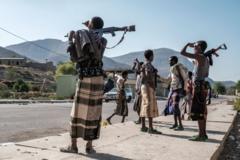The political landscape in Ethiopia faces renewed tensions as the Tigray People's Liberation Front (TPLF), which has governed the northern region of Tigray, decries a decision by the National Election Board of Ethiopia to revoke its legal status, effectively banning it from political participation. This move has raised alarms about the potential for renewed violence and instability in a region already reeling from the aftermath of a devastating civil war.
The electoral board cited the party’s failure to conduct a general assembly as the basis for the ban on Wednesday. This decision unfolds within a complex backdrop of heightened political strife in Tigray, coinciding with impending national elections scheduled for June of the following year. The TPLF, which was instrumental in Ethiopia's governance from 1991 until 2018, has stated the ban poses a "serious threat" to the Pretoria peace agreement, which ended two years of unprecedented conflict in the region.
In response, TPLF leaders have reached out to the African Union, urging it to mediate and apply pressure on the federal government to halt the ban's enforcement. In a letter, they argued that the ban undermines the rights that the TPLF reclaimed through the 2022 peace agreement and that all political differences should be resolved via dialogue.
Ammanuel Assefa, deputy chairman of the TPLF, expressed the precariousness of the situation, stressing that the ban jeopardizes the sacrifices made by the local populace during the war. Moreover, the delayed implementation of peace agreement terms, such as the resettlement of over one million internally displaced individuals, has only intensified fears of a return to conflict.
International observers, including representatives from the US, UK, and EU, have echoed concerns regarding escalating tensions, warning against a relapse into violence in the region. As Ethiopia stands at a crossroads, the global community watches closely, hopeful for a resolution that can sustain the hard-fought peace achieved in the aftermath of devastating conflict.
The electoral board cited the party’s failure to conduct a general assembly as the basis for the ban on Wednesday. This decision unfolds within a complex backdrop of heightened political strife in Tigray, coinciding with impending national elections scheduled for June of the following year. The TPLF, which was instrumental in Ethiopia's governance from 1991 until 2018, has stated the ban poses a "serious threat" to the Pretoria peace agreement, which ended two years of unprecedented conflict in the region.
In response, TPLF leaders have reached out to the African Union, urging it to mediate and apply pressure on the federal government to halt the ban's enforcement. In a letter, they argued that the ban undermines the rights that the TPLF reclaimed through the 2022 peace agreement and that all political differences should be resolved via dialogue.
Ammanuel Assefa, deputy chairman of the TPLF, expressed the precariousness of the situation, stressing that the ban jeopardizes the sacrifices made by the local populace during the war. Moreover, the delayed implementation of peace agreement terms, such as the resettlement of over one million internally displaced individuals, has only intensified fears of a return to conflict.
International observers, including representatives from the US, UK, and EU, have echoed concerns regarding escalating tensions, warning against a relapse into violence in the region. As Ethiopia stands at a crossroads, the global community watches closely, hopeful for a resolution that can sustain the hard-fought peace achieved in the aftermath of devastating conflict.





















